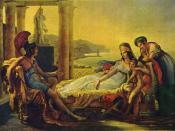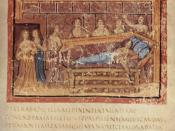In the Ancient World, women were not portrayed as they are today in modern literary works; women usually played controversial roles where their actions ranged from killing their own family to destroying their own town. Women in ancient Greek plays and Roman stories did not posses the social standing that we naturally think of today, many times their only power was to strike back when they were hurt. Medea, Phaedra, and Dido, admirable or dangerous, are among the most complex literary characters of any period.
Medea, of Euripides' play Medea, represents the destructive quality of possessive desire often portrayed by Greek women. Medea becomes enraged by Jason when he leaves her to be with the daughter of the King of Corinth. She reacts by destroying everything around him. She destroys his new wife, her father the King, and even goes as far as to kill her own two children she had with Jason in order to hurt him.
Medea rationalizes her actions by saying if she cannot have Jason, the thing she wants the most in life, then he cannot have the things that matter the most to him in his life. Medea illustrates her nature of possessive desire for Jason with the line, "At last I understand that awful deed I am to do; but passion, that cause of direst woes to mortal man, hath triumphed o'er my sober thoughts (Euripides 104). From this you can see that Medea is only concerned with herself and her desires as opposed to her famil; she kills her own children to hurt her husband.
Like Medea, Euripides writes another play Hippolytous, with a similar character named Phaedra. Phaedra is the wife of Theseus that has become obsessed by an incestuous passion for her stepson, Hippolytus. Phaedra attempts to...


